o, you’ve spent countless hours (and maybe a few late nights) wrestling with your LMS, only to find yourself muttering under your breath at confusing dashboards and rigid course-building tools. You’re not alone. Many organizations start off excited about Absorb LMS – until the hidden fees, the clunky user experience, and the feeling that you’re squeezing your training vision into a one-size-fits-all box start to creep in.
If your patience has hit its limit, the good news is there are plenty of refreshing alternatives out there. In this article, we’ll walk you through ten Absorb LMS competitors that might just give you the flexibility, support, and creative freedom you’re yearning for – without turning your eLearning dreams into a hair-pulling exercise.
Why look for Absorb LMS alternatives?
Absorb LMS isn’t bad – in fact, it’s a pretty strong contender in the LMS world. But even the best tools have their drawbacks, and sometimes, they just don’t fit the bill for everyone. Here are a few reasons you might want to jump ship:
Pricing feels steep
Let’s be honest: Absorb LMS isn’t exactly the most budget-friendly option – and to make things trickier, you won’t even see pricing until you’ve gone through a few rounds of Absorb LMS demo process. If you’re a small business or an organization with a tight budget, it can feel like a heavy hit. Additional features can drive up the cost quickly, leaving you questioning whether every penny is justified. Many other LMS platforms offer more flexible pricing tiers that align better with tighter budgets.
Overwhelming features
While having a feature-rich LMS is great, Absorb LMS solution can feel a bit overwhelming for smaller teams or organizations that don’t need every bell and whistle. It’s easy to get lost in complex dashboards and settings that you might never even use. This complexity can also slow down the user adoption process, as new users grapple with figuring out which features actually matter. Experience shows – simpler really is better when it comes to training efficiency.
Customization limits
Some users report that Absorb’s customization options aren’t as flexible as they’d like. If you’re looking to tailor every aspect of your courses — from branding elements to unique layouts – you might find yourself running into roadblocks. This can be disheartening if your brand identity is a key focus of your eLearning content. Ultimately, limited customization can diminish the overall learner experience and dilute your brand impact.
Outdated Absorb LMS learner experience
LMS tools should make life easier, not harder. If your team or learners are struggling to navigate Absorb LMS, that’s a big red flag. A cluttered Absorb LMS learner experience can slow down the learning process and increase the time it takes to train new hires. Plus, constant confusion can lead to frustration, lowering overall engagement and satisfaction.
Weak reporting capabilities
Absorb LMS solution has been around for a while, and some of its core functionalities can feel outdated – especially when it comes to reporting. Pulling the exact metrics you need often means jumping through hoops, and limited data visualization options leave a lot to be desired. In a data-driven world, this lack of robust analytics can stifle your ability to improve training programs or demonstrate ROI. If you’re eager for deeper insights and modern reporting tools, it might be time to explore a platform that better aligns with current trends.
Whatever your reason, rest assured, there’s an LMS out there that better suits your needs. So, without further ado, here are 10 of the best Absorb LMS alternatives to consider.
#1. EducateMe – The most innovative, highly customizable Absorb LMS alternative
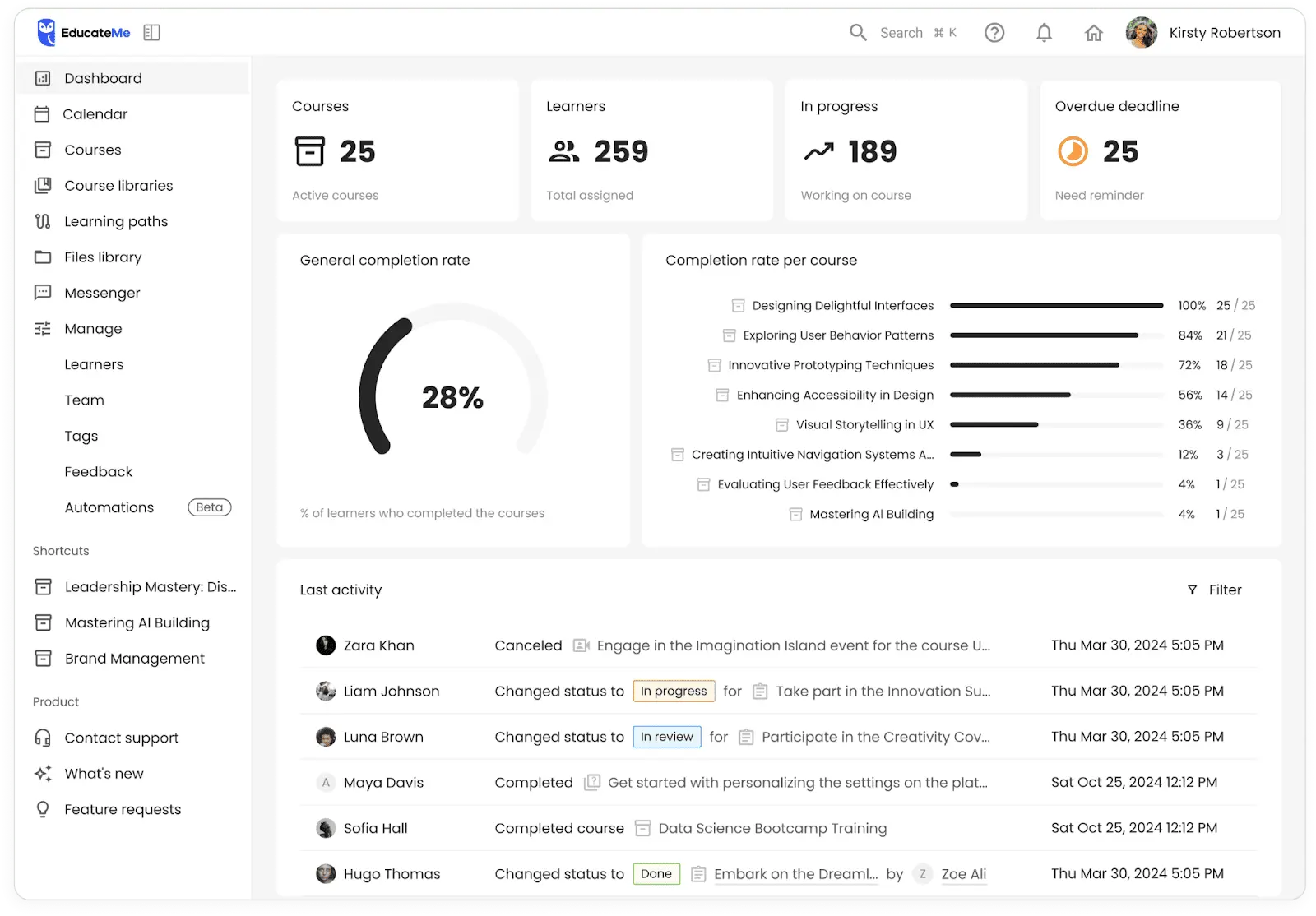
I recently tried the free trial of EducateMe, and I was genuinely impressed by how customizable and scalable the platform is, especially compared to other Absorb LMS competitors I’ve looked into for corporate training. Whether it's employee onboarding or customer education, EducateMe stood out with its dynamic content features and smart automation tools. What really caught my attention was the seamless integration with over a thousand other tools, which made setup and workflow surprisingly smooth. The branding options are super flexible too, so I could easily tailor the look and feel to match our company’s identity. And with the ability to design personalized learning paths, it feels like a platform that can truly grow with your training needs.
With EducateMe's free trial, you can explore all of the core features, AI, and more, before making a decision.
What I learned testing EducateMe (and why it beats Absorb LMS)
- Intuitive role and permission control. Assigning roles and managing user access was straightforward thanks to smart role management tools.
- Next-level customization. I had full white-label control: customized visuals, labels, scripts, and seamless SSO setup to match our brand.
- Powerful automation features. The AI-supported course creation and automated notifications helped reduce a ton of repetitive admin work, letting me focus on strategy instead.
- Engaging, diverse content formats. I was able to combine instructor-led sessions, SCORM packages, videos, attachments, and quizzes – keeping the learning experience dynamic and effective.

- Seamless integration with the tools that I use. With 1,000+ integrations (APIs, Zapier, iFrame), syncing with our current systems was easy – no double data entry, just smooth workflows.
- Scalable and growth-ready. Organizing and expanding my course library was effortless with the tagging system. It’s clearly built to scale – no need to switch platforms later.
#2. Docebo – Best AI-powered Absorb LMS competitor
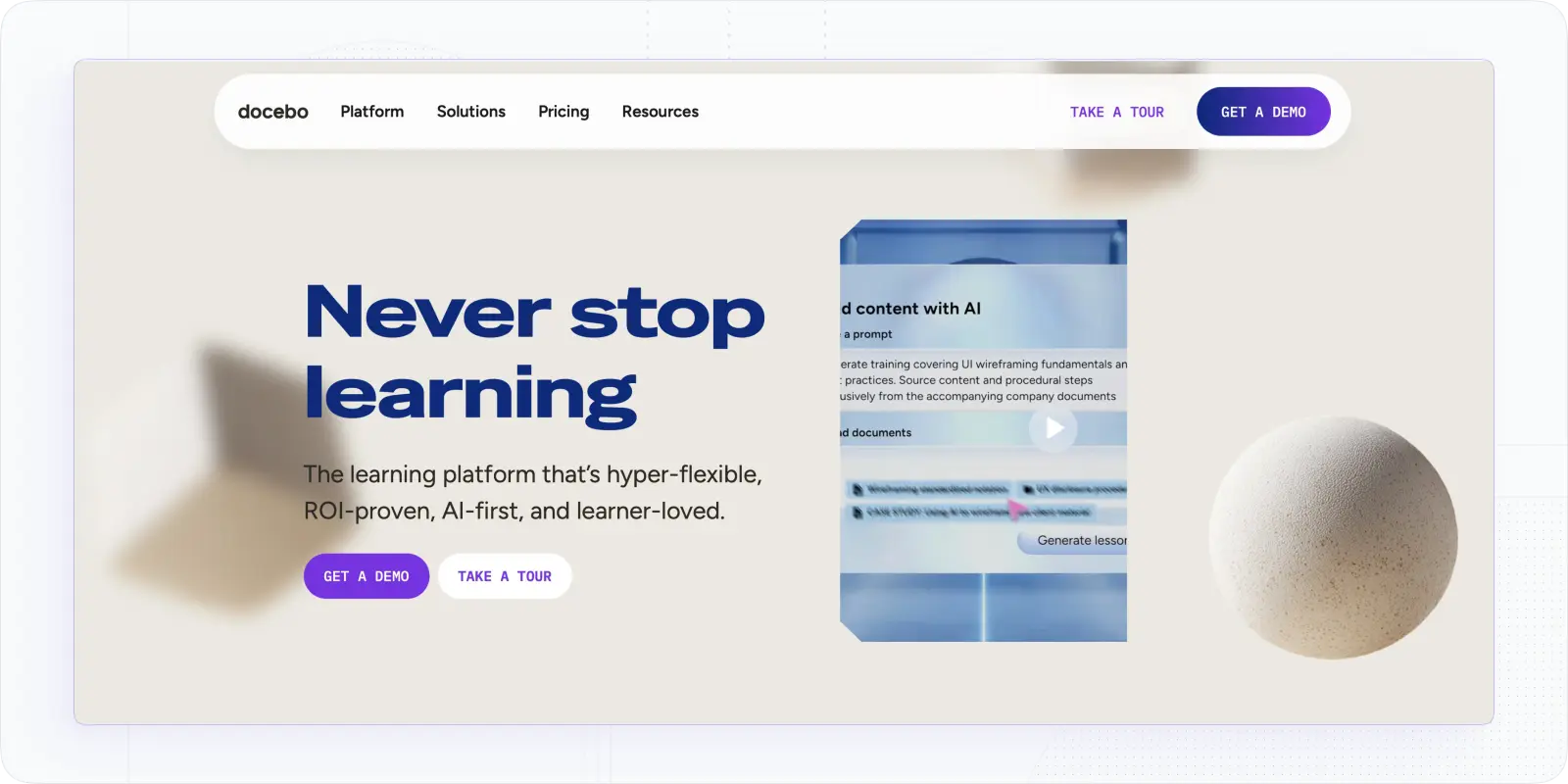
After trying out Docebo, I was impressed by how intelligently the platform adapts to learners' needs while offering tools that keep engagement high across different audiences. It felt like the platform was managing the tedious tasks, so I didn’t have to – especially with its AI features, content personalization, and intuitive automation. Here’s a quick breakdown of what stood out during my hands-on experience:
Pricing: Custom pricing, read more in article "Docebo Pricing: Complete Guide to Costs, Plans, and Add-Ons"
My experience with Docebo
- AI-powered recommendations that actually help. Docebo’s intelligent content suggestions felt like having a learning assistant built in – it surfaced the right material just when I needed it, saving time and making learning smoother.
- Gamification that boosts motivation. Features like leaderboards, badges, and friendly challenges made the experience more fun and drove consistent learner engagement across the board.
- Great for multiple audiences. I was trying to set up training for employees, partners, or customers, so Docebo’s branding and automation options helped me deliver a consistent, high-quality experience to each group.
- Personalized learning paths. The AI didn't just suggest content – it tailored learning paths based on user skills and behavior, which helped keep training relevant and motivating.
- Built for global teams. With its multi-language support and enterprise-ready infrastructure, it was easy to see how Docebo could support a global workforce without extra hassle.
- Deep insights through analytics. The platform’s reporting tools gave me access to real-time data on learner progress and course performance, helping me fine-tune content faster and more effectively.
#3. Moodle – Top free, open-source Absorb LMS alternative
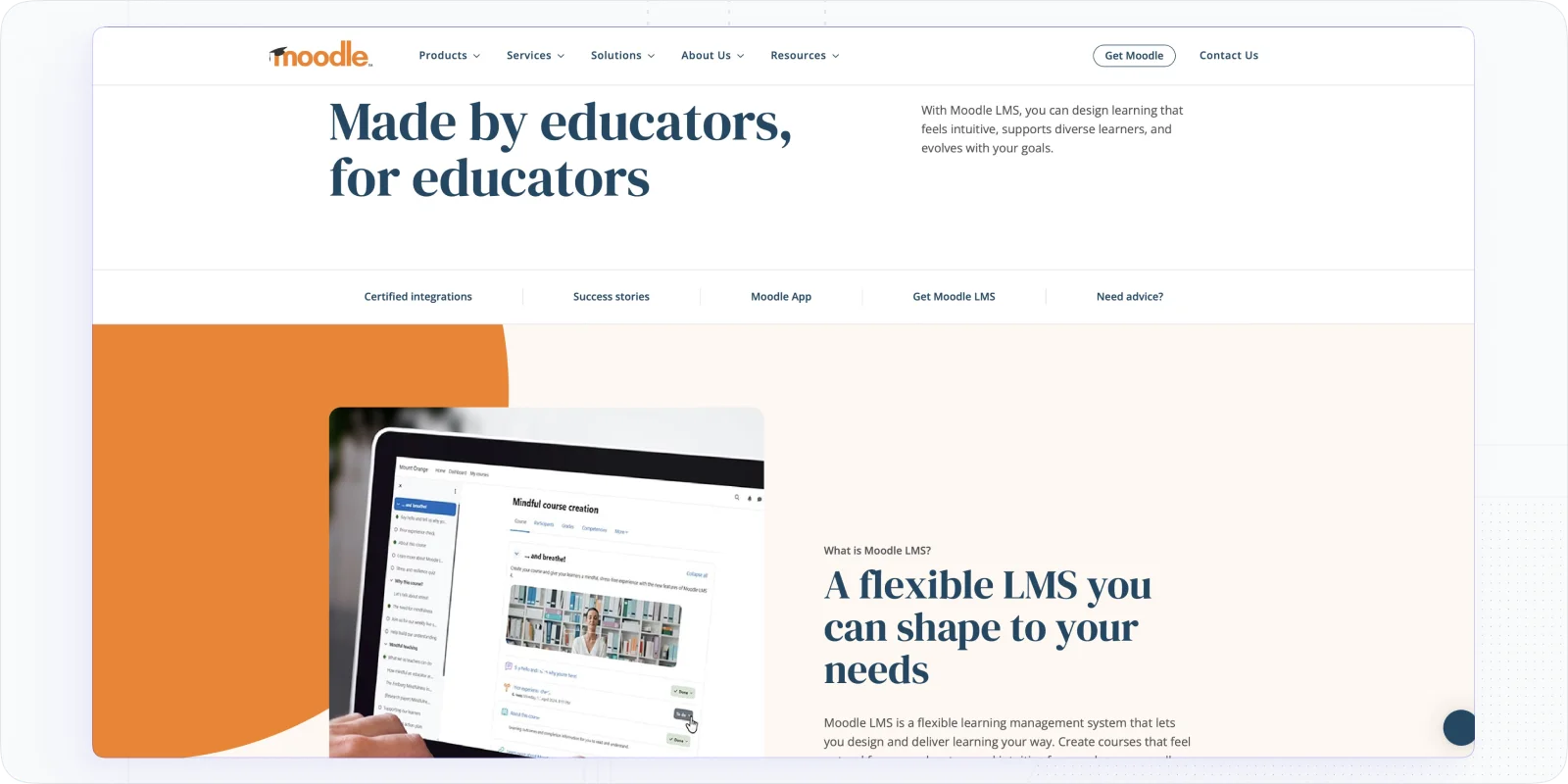
When I explored Moodle, it became clear why it's such a long-standing favorite among open-source LMS options. It might not be as flashy out of the box, but the level of control it gives you is unmatched. For anyone who wants full customization without recurring licensing costs, Moodle is a good contender – and its community support makes a big difference too.
Pricing: Moodle is free to use, but hosting and maintenance costs can vary depending on the service provider.
My take on Moodle
- Truly free & open-source. No subscription fees, just a powerful platform with tons of community-made plugins.
- Fully customizable. I could tweak the core, try different themes, and shape Moodle exactly how I wanted.
- Strong community support. Whenever I needed help or inspiration, the global Moodle community had my back.
- Scales with you. Whether you're starting small or going big, Moodle grows right alongside your needs.
#4. Cornerstone OnDemand – Ideal for talent management
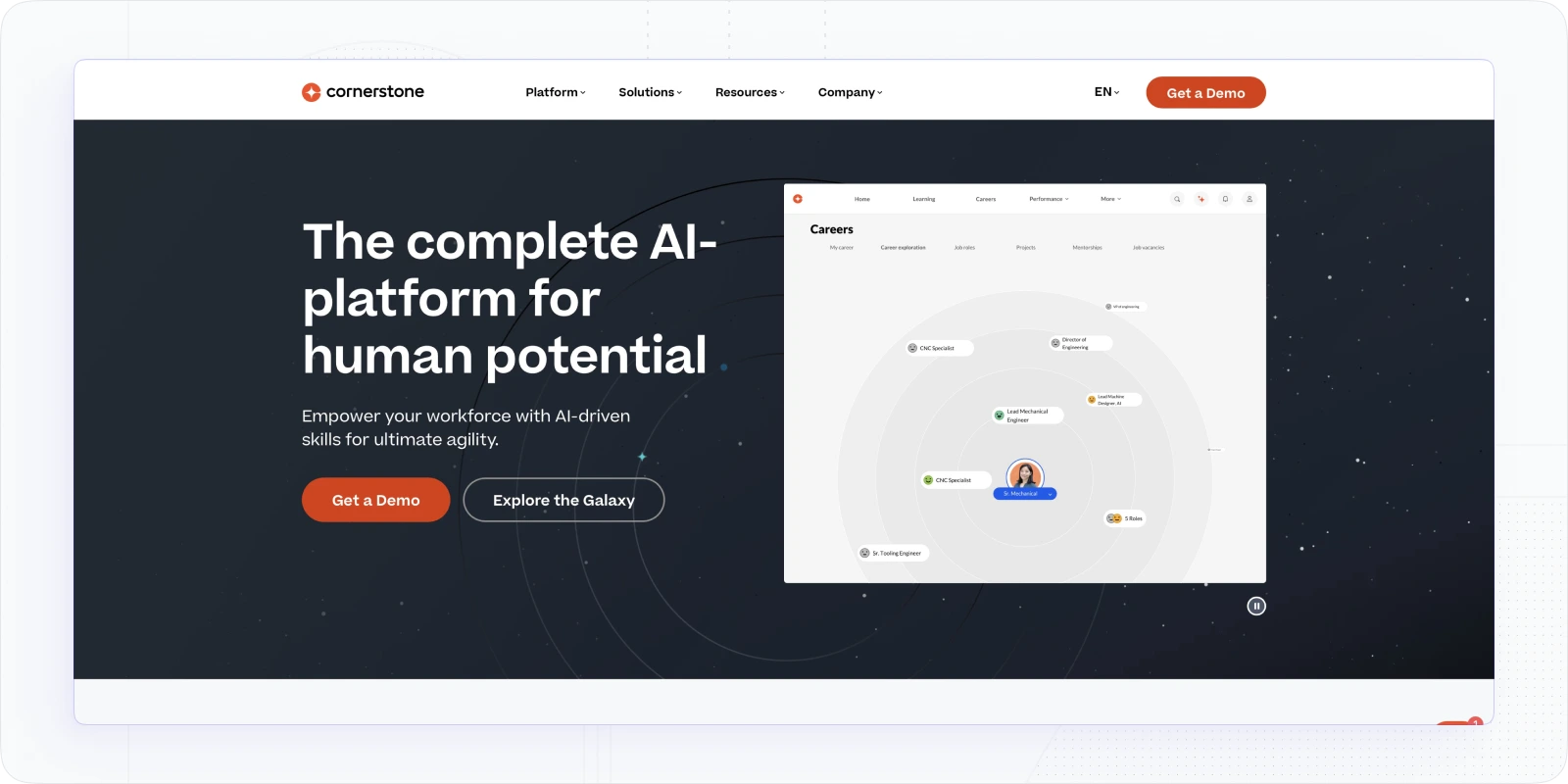
When I explored Cornerstone OnDemand, I quickly realized it’s not just a learning platform – it’s a complete talent management solution. It stood out for how well it connects training with bigger HR goals, especially for large, complex organizations. Here’s what I noticed during my experience:
Pricing: available upon a quote.
My experience with Cornerstone OnDemand
- Beyond just learning. It’s a full talent management suite – training, onboarding, and performance reviews all in one place.
- Strategic alignment with HR. I liked how learning paths were tied directly to career growth and broader organizational goals.
- Powerful analytics. The skill gap analysis tools gave me real, actionable insights to build smarter development plans.
- Built for large, global teams. It handled multinational users smoothly, making it easy for distributed teams to learn and collaborate together.
#5. Tovuti – One of the most interactive Absorb software competitors
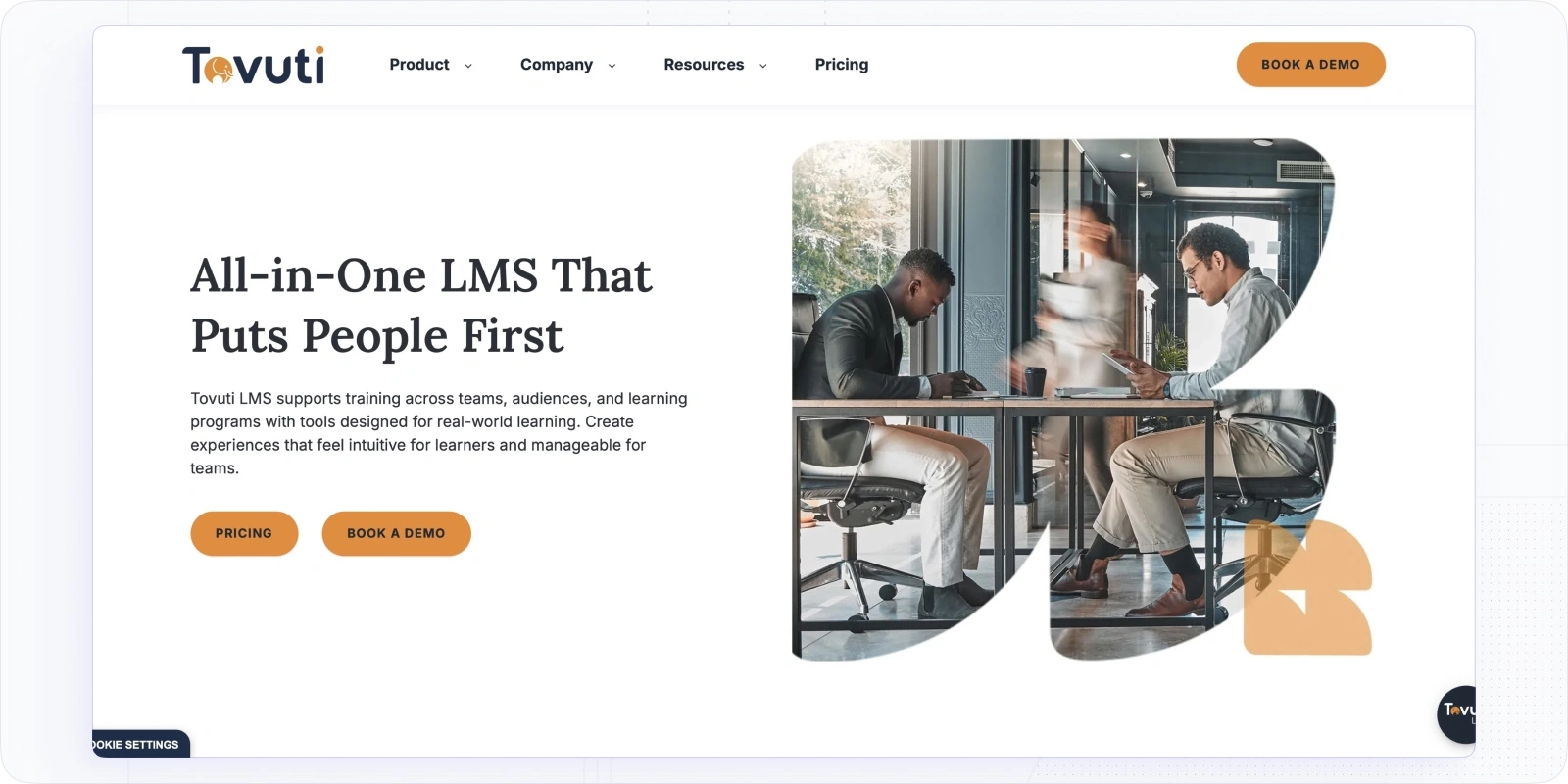
When I tried Tovuti, it immediately stood out as a dynamic alternative to Absorb LMS. The interactive course-building widgets and built-in gamification features really brought our training content to life. I appreciated how easy it was to create engaging courses using the drag-and-drop tools, and the platform’s community features – like discussion boards – made the learning experience feel more connected and collaborative. Tovuti felt like more than just a place to deliver content; it was immersive. Plus, managing both virtual and in-person training events was simple thanks to the integrated scheduling tools.
Pricing: Custom pricing quote that you can get from filled out contact form.
Why Tovuti worked good for me
- Engaging course builder. I was able to create dynamic courses using quizzes, flashcards, badges, and leaderboards – it kept learners active and interested.
- Built-in community features. Discussion boards and social tools made it easy for learners to connect, collaborate, and support one another.
- Seamless event management. Hosting and tracking both virtual and in-person training sessions was straightforward with Tovuti’s built-in scheduling tools.
- Modern, intuitive interface. The platform looks and feels current, which made navigating and building content feel smooth and up to date – nothing clunky or outdated.
#6. Bridge – People-focused LMS
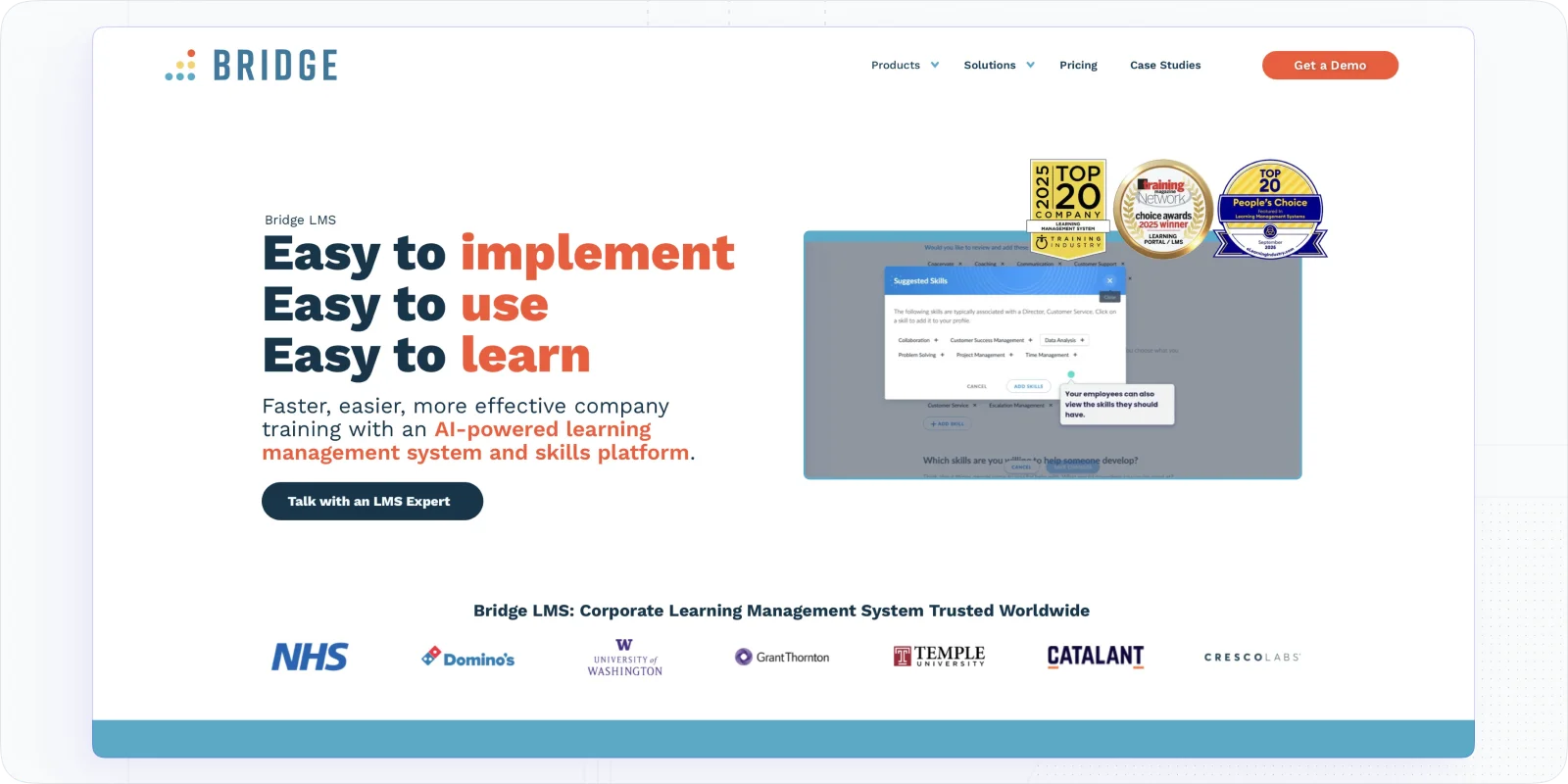
When I tested Bridge, I could tell right away that it takes a more people-focused approach than many other platforms. It’s not just about delivering courses – it’s about connecting learning with performance and engagement. I liked how it aligned employee development with company goals while offering tools that made both creation and reporting easy. Features like skill assessments and built-in 1:1 meeting scheduling helped bring training closer to real, everyday performance.
My experience with Bridge LMS
- Performance-focused learning. I really appreciated how Bridge integrated performance reviews and employee check-ins to keep development on track and goal-aligned.
- Clean, intuitive interface. The user experience felt smooth and simple from day one—less admin hassle and a shorter learning curve for everyone involved.
- Built-in engagement tools. Features like kudos, feedback loops, and goal tracking helped foster a more connected and motivated learning environment.
- Flexible and scalable. As our team grew and changed, Bridge easily adapted—making it a solid fit for a growing or evolving organization.
#7. SAP Litmos – Enterprise-ready LMS
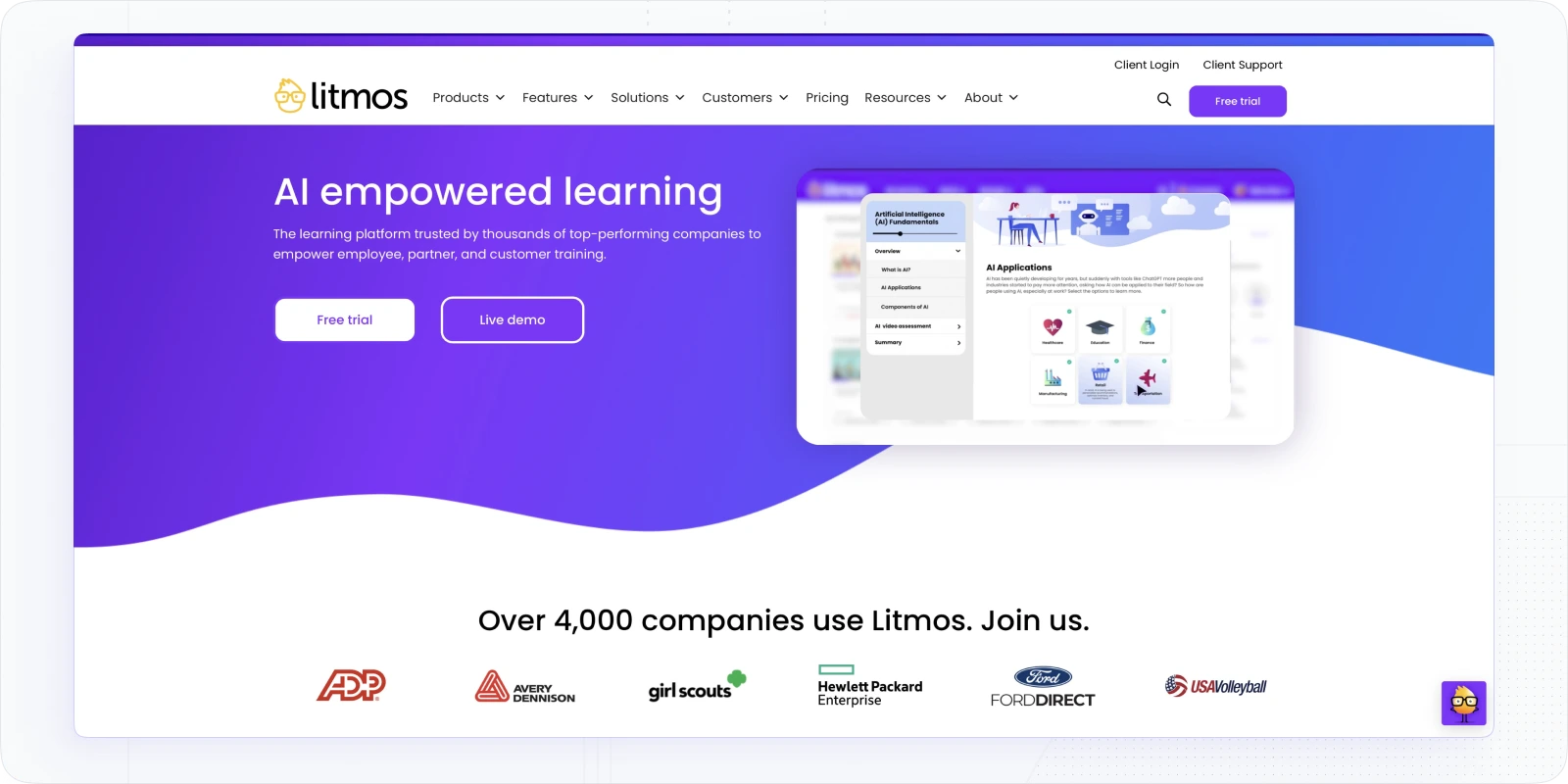
When I explored SAP Litmos, it felt like a platform built with enterprise needs in mind. It offered all the features I’d expect for a large organization – automated enrollment, compliance tracking, and even eCommerce capabilities. I especially liked the combination of ready-to-go courses with the flexibility to add our own branding. And the integrations with tools like Salesforce and HR systems made syncing everything across departments surprisingly seamless.
Pricing: available upon a quote, yet appears to cost less than Absorb LMS.
Why it’s better than Absorb LMS
- Built for enterprise integration. Connecting Litmos with systems like SAP, Salesforce, and our HRIS was smooth – it kept everything in sync without extra manual work.
- Compliance made easy. I could automate course assignments and track who was meeting regulatory requirements without chasing anyone down.
- Ready-to-use and customizable. The course library helped us launch quickly, and I could still brand everything to fit our organization’s identity.
- eCommerce capabilities. I appreciated the ability to set up a branded storefront and sell training directly – great for external programs.
- Enterprise-grade security. With strong security protocols in place, I felt confident about how data was being handled and protected.
#8. TalentLMS – Best budget-friendly Absorb LMS competitor
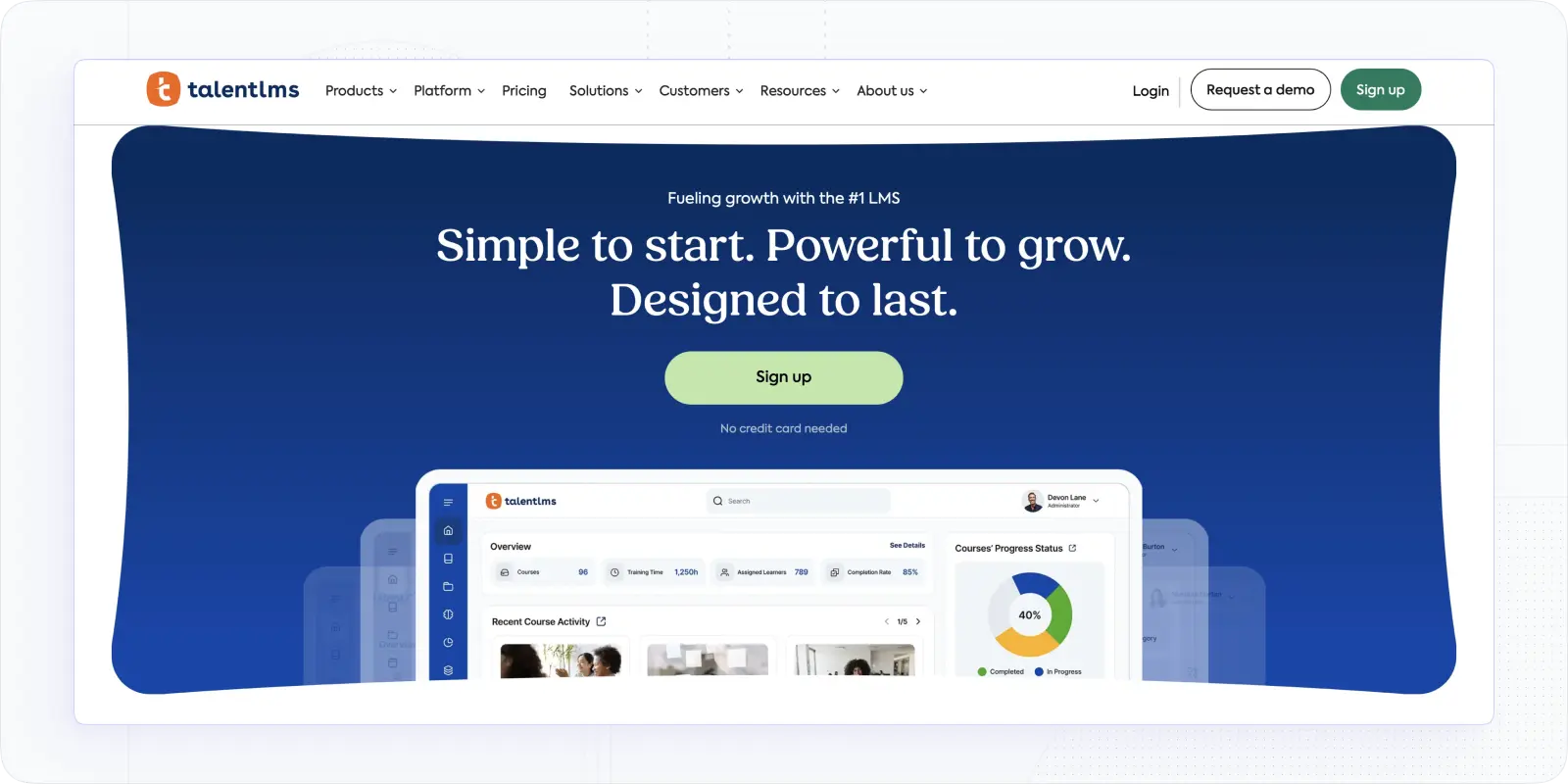
When I tried out TalentLMS, I found it refreshingly simple and easy to navigate – especially compared to more complex platforms. It’s clearly built with small to midsize businesses in mind, offering just the right features without overcomplicating things. I was able to get started quickly, brand the portal to match our company, and roll out training without a steep learning curve. Plus, the pricing structure is super accessible, even for lean teams.
Pricing: Free Plan; Core – $109/mo; Grow – $229/mo; Pro – $399/mo; Enterprise – by quote.
Why it’s better than Absorb LMS
- Budget-friendly pricing. I liked that there’s a free plan and affordable monthly tiers – it gave me the flexibility to grow our training program at our own pace.
- Easy course creation. The drag-and-drop tools and templates made building content super straightforward – perfect for someone who doesn’t want to deal with tech headaches.
- Customizable certifications. I could tailor certifications, choose expiration options, and even automate recertifications for compliance – really helpful for recurring training.
- Mobile-ready learning. Learners had no issues accessing content from any device, which kept things smooth and accessible no matter where they were.
- Gamification is built in. Badges, points, and leaderboards added a fun layer that kept our team engaged and motivated to keep learning.
#9. LearnUpon – Streamlined learning portal
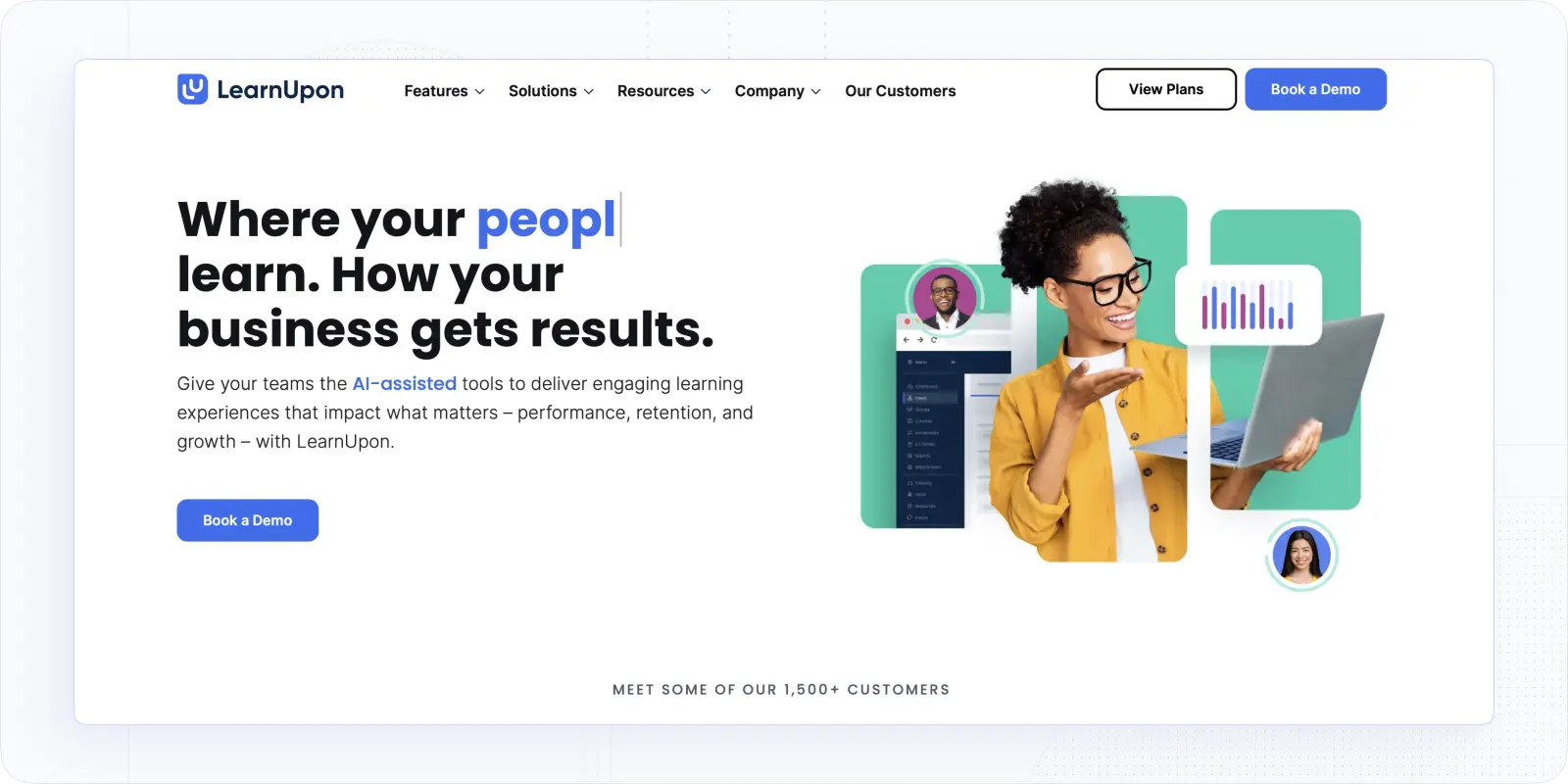
When I tested LearnUpon, from the beginning I noticed how clean and intuitive everything felt. The platform made it easy to create and manage courses without getting bogged down in complexity. Whether I was setting up training for employees, partners, or clients, the ability to build separate branded portals really stood out. Plus, with seamless integrations and helpful support, it didn’t take long to get a full learning ecosystem up and running.
However, some of the customization options felt a bit limited compared to more design-flexible platforms, and reporting lacked some of the deeper insights I’ve seen elsewhere.
Pricing: By quote.
My review of LearnUpon
- User-friendly interface. The clean dashboards and simple course builder made day-to-day management easy – it feels like there is no steep learning curve at all.
- Branded portals for every audience. I was able to create separate portals for different groups, like partners and customers, each with its own look and feel.
- Easy integrations. Connecting LearnUpon to tools like our CRM, webinar platforms, and payment system was fast and didn’t require extra help from IT.
- Time-saving automation. Automating tasks like reporting, user management, and HR integration saved me a ton of manual work.
- Strong customer support. Their success team was genuinely helpful, sharing onboarding tips and best practices that made the rollout smoother and faster.
#10. LearnWorlds – Highly interactive online course creation
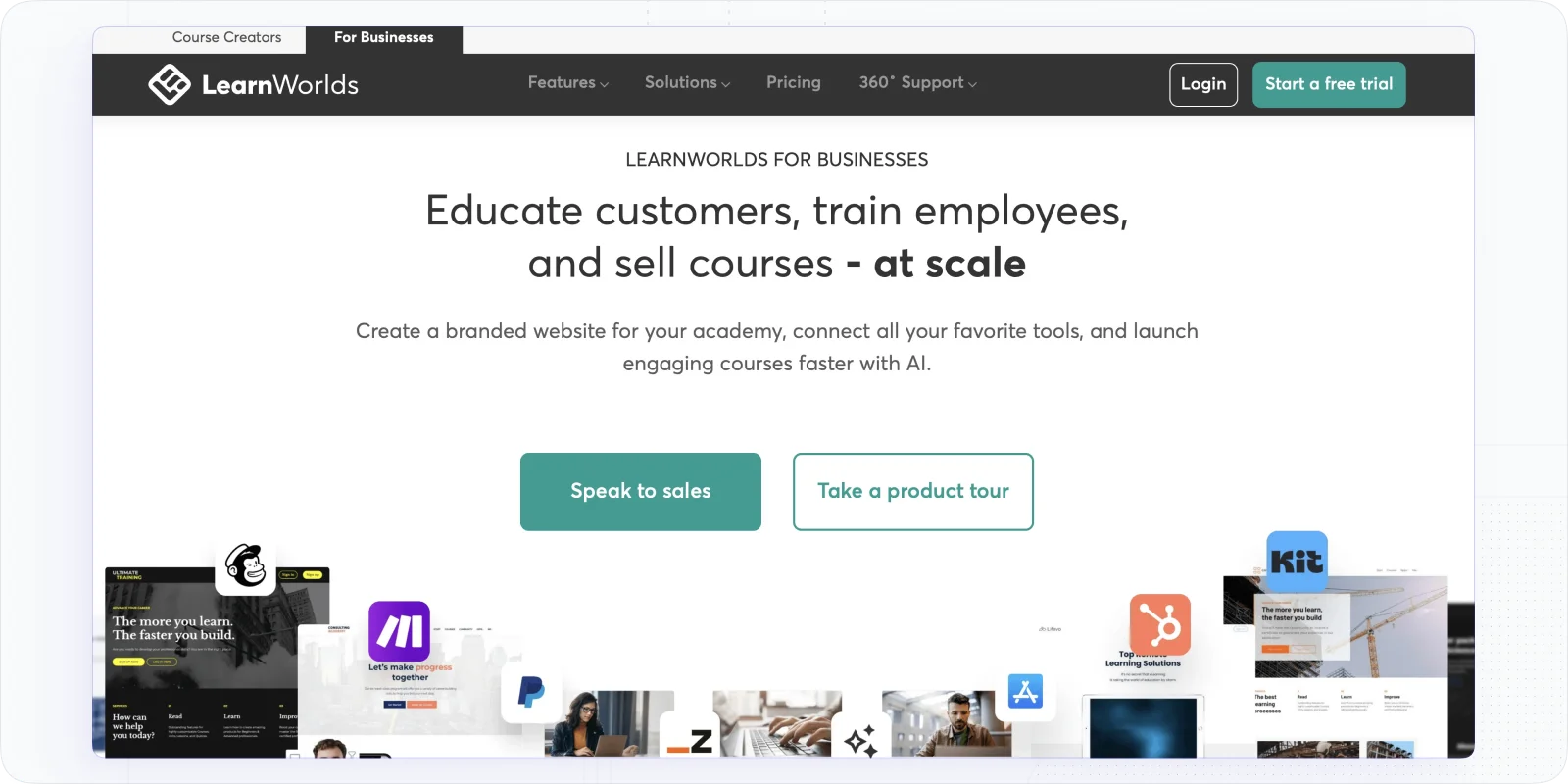
I recently spent some time exploring LearnWorlds, and it really stood out for its strong focus on creating visually engaging, interactive courses. The course builder is packed with features, and I didn’t need any coding skills to start building something that looked polished. It’s especially useful if you want to add videos, quizzes, or other interactive elements that go beyond basic slide decks. I also liked that it includes built-in eCommerce tools, which made the idea of selling courses feel less intimidating.
That said, there’s definitely a learning curve with all the features available – it’s not the simplest platform out there. But once I got the hang of the layout and workflows, it became easier to move quickly.
Pricing: free trial available; Starter Plan is $29/mo; Pro Trainer is $99/mo; Learning Center Plan is $299/mo; High Volume & Corporate Plan is available upon the call.
Why it’s better than Absorb LMS
- Highly interactive course builder. I could build engaging content with quizzes, interactive videos, and multimedia, and it takes around 2 hours.
- Good for selling courses. The eCommerce tools are built in, so I didn’t have to worry about setting up third-party systems to start monetizing content.
- Branding control. Being able to customize everything from the color scheme to the domain helped me create a consistent brand experience.
- Takes a little time to learn. There’s a lot under the hood, so it took a bit of trial and error before I felt confident using it efficiently.
Conclusion
Switching LMS platforms is never trivial, but Absorb LMS has become outdated and no longer keeps pace with modern e-learning needs. Fortunately, there are more advanced alternatives out there – most notably EducateMe, an innovative, highly customizable solution that evolves with your organization’s training demands. Moodle offers unmatched flexibility, while Docebo provides cutting-edge features, so there really is something for every learning environment.
Take a moment to assess your specific goals, test-drive a few platforms, and transform your training experience. Ready to see how EducateMe can deliver the results you’re after? Sign up now for a free 14-day trial – and experience the difference for yourself!






















